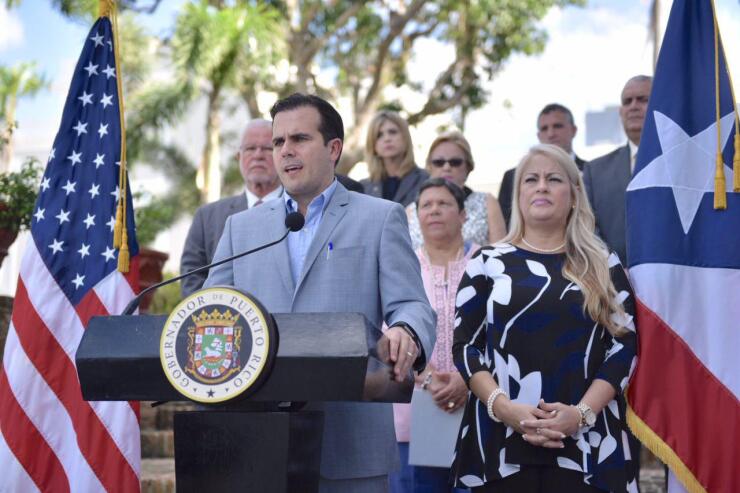Puerto Rico's political upheaval has already hurt the economy and a disorderly transfer of power may lead to near-term delays in the territory's historic debt restructuring.
Gov. Ricardo Rosselló said late Wednesday he would resign effective Aug. 2, leaving the future of the government in flux. His resignation came after a series of corruption arrests, leaked chats, and protests that slowed economic activity by about 15% over two weeks, according to a study by Gustavo Veléz, chair of Inteligencia Económica.
Under Puerto Rico’s constitution the secretary of state is in line to replace the governor, but the secretary of state just resigned and the post is open. So the constitution says the governorship should go to the secretary of justice, Wanda Vázquez Garced.

Observers expressed doubt that this will happen. Thomas Rivera Schatz has just become the new president of the the New Progressive Party, which controls the governor’s office and the legislature. Rivera Schatz, who is president of the Puerto Rico Senate, is reported to hate Vázquez Garced, making collaboration between them difficult in the 17 months left in the governor’s term.
To have Vázquez Garced become the governor would lead to a “political crisis,” said Javier Colón, a professor at the University of Puerto Rico.
In order to avoid this difficult interaction and to get someone in the governor’s office who is poised to run for reelection — something that Vázquez Garced is unlikely to seek — the party’s leaders may take steps to find a different governor. One possibility would be for Rosselló to nominate a secretary of state and for the island’s House and Senate to confirm him or her before Aug. 2.
Another might be for Vázquez Garced to assume office and to then nominate and have confirmed a new secretary of state before resigning her role as governor.
The party’s leaders are currently discussing possible future governors. Colón suggested that Pedro Pierluisi could become the next governor. He was Puerto Rico’s last non-voting representative to the U.S. Congress and was a close runner-up to Rosselló in the 2016 gubernatorial NPP election primary.
Since Pierluisi helped write the Puerto Rico Oversight, Management, and Economic Stability Act, he might be more inclined to collaborate with the Oversight Board, Colón said.
Some of the corruption scandals that have recently hit parts of the Rosselló administration had been brought to her attention and some Puerto Ricans perceive Vázquez Garced as having done little or nothing, Colón said. This is another reason that the NPP may try to avoid her taking the reins of government.
If she becomes governor, “The political pressure will be very intense,” Colón said.
On Wednesday El Vocero reported that the Puerto Rico Office of Government Ethics was looking into Vázquez Garced’s handling of some supply trucks in the aftermath of Hurricane Maria. In response the secretary of justice released a statement that said, among other things, “the interpretation given to these matters [by the story] is false and defamatory.”
The business community is still uncertain about the situation, Veléz said. “We’re still in the crisis as far as who will be the next governor.”
While the business community would like the governor to have a better attitude toward the board, it is unclear if that will happen, Veléz said.
If a good governor comes into office and stability is restored, the economic situation could quickly return to normal, Veléz said.
“The governor's actual resignation doesn't change too much," said Municipal Market Analytics Partner Matt Fabian. "The [board] should put its debt restructuring plans in hold while PR government situation stabilizes and to allow for a full validation of all data that came from the commonwealth and a re-vetting of any professionals hired or used by the Rosselló administration. The commonwealth itself should begin a deep study of potential corruption in the government.”
By contrast, Puerto Rico Senate Minority Leader Eduardo Bhatia Gautier emphasized change and potential for continued change: “Puerto Rico has just experienced a democratic revolution lead by its young people. They are saying enough is enough with corruption, with lies and deception. And their voices are being heard.
“Silence for all Puerto Ricans is not an option,” the senator continued. “This is a new awakening that I hope lasts forever. It is a new Puerto Rico.”
The island’s bonds were mixed Thursday with the PREPA electric power bonds down 1 7/8 cents on the dollar and the 2012 dated GO bonds up 1 1/8 cents on the dollar, according to ICE Data Services.
Chip Barnett contributed to this story.





